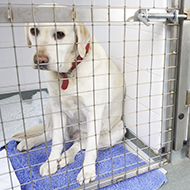SVN seeks help with canine behaviour dissertation

The study is looking into the behavioural impact of isolation for more than seven days.
A veterinary nursing student has launched a survey for her dissertation looking into the behavioural effects of long-term medical isolation in canines.
Final year Harper Adams student Amy Carter would like to hear from RVNs that have nursed a canine patient over 12 months old, admitted for a condition that warranted medical isolation for more than seven days.
The survey, a study into the behavioural effects of reduced stimulation in long-term isolated canines, is available on the Harper Adams website.



 The latest
The latest